#Peter Berling
Explore tagged Tumblr posts
Text

Revolver, Sergio Sollima (1973)
#Sergio Sollima#Dino Maiuri#Massimo De Rita#Oliver Reed#Fabio Testi#Paola Pitagora#Agostina Belli#Frédéric de Pasquale#Marc Mazza#Reinhard Kolldehoff#Bernard Giraudeau#Peter Berling#Alexander Stephan#Daniel Beretta#Aldo Scavarda#Ennio Morricone#Sergio Montanari#1973
2 notes
·
View notes
Text
Aguirre, the Wrath of God (1972)

Aguirre, the Wrath of God is a unique experience. It puts you in the same state as its characters through its deliberately paced, minimalist story. They don’t know where the journey will end. Neither do you. It feels like someone is reading you the old, dusty pages of a journal that’s been dug up after decades of being forgotten. The “unimportant” moments - the kind you wouldn't mention in daily logs - are missing, which makes what’s not shown as important as what is. I wouldn’t want every film to be like Aguirre, but I’m glad this one is.
In 1560, Spanish conquistadors are convinced El Dorado, the legendary city of gold, is hidden deep in the Amazon jungle. With the search going nowhere and supplies running low, Gonzalo Pizarro (Alejandro Repullés) orders Pedro de Ursúa (Ruy Guerra) and a group of forty men (with their indigenous slaves) to build rafts and travel downriver to look for provisions. If they do not return within a week, their expedition will be considered lost.
The opening shot is a stunner. Simultaneously, we see the immeasurable power and folly of the conquistadors. The line of soldiers, noblemen and slaves traveling down the side of the Andes mountains is endless. When the camera zooms in to focus on the individual people, the spaniards look like ill-equipped martians clumsily making their way down the narrow path. In their metal armor (to defend against what?) with their halberds (to attack who?), following slaves who push cannons, wheel carts, and lavish litters carrying women dressed in fancy gowns, the expedition's imminent failure is obvious. Even if El Dorado did exist, how could they find it with this equipment slowing them down? Their quest is made even more foolish-looking by the camerawork. At first glance, the voyage looks epic. Then, reality sets in. Everything is short in a natural, unglamorous way. You "know" how this journey will end even before Don Pedro de Ursúa, his second-in-command Don Lope de Aguirre (Klaus Kinski) and Brother Gaspar de Carvajal (Del Negro) even step foot on their doomed raft.
Aguirre feels much longer than its 94-minute running time because once the journey to unknown places begins, that’s all the movie is. There are no character arcs. In fact, by the end, you barely know any of the characters. Each scene is like the highlights of a long, boring, doomed journey… that includes the sanity of the people in charge slipping away, daily attacks from unknown assailants, starvation, suspected murder, and death at every turn. It feels like journal entries brought to life in that Brother Gaspar wouldn’t have written about the life stories of the conquistadors who disappear in the middle of the jungle, or suddenly fall in the water because there’s an arrow sticking through their neck. All he does is tell us “Today, another man died. His last words were ….” The details aren’t important. What’s important is the way the movie makes you feel. Aboard the raft is a slave who knows how to play music. The only problem is that he only knows a single song, which he plays over, and over, and over. A jaunty tune becomes the sound of your sanity draining away. You see the crew making one bad decision after another, practically begging their journey to end in disaster. It can’t be that they don’t know what they’re doing. You get the impression that the jungle is compelling them to make the worst move possible. With the hallucinations that come in during the final scenes, the sudden bursts of violence that make you wonder if you just saw and heard what you did and the moments that couldn’t possibly have been scripted (they had to just happen while they were shooting), Aguirre feels so eerily real you feel like you're there. Like the men, you have no faith in any sort of satisfying ending but you keep moving forward.
Aguirre, the Wrath of God is a film for people who want something different. The plot is deliberately boring at times. Anywhere else, that would be a major flaw. Here, it enhances the experience. I know that doesn’t make any sense but that’s the thing. This movie doesn’t make any sense. It baffles you completely, which means it's unforgettable. (English dub, November 5, 2021)

#Aguirre the Wrath of God#movies#films#movie reviews#film reviews#Werner Herzog#Klaus Kinski#Helena Rojo#Del Negro#Ruy Guerra#Peter Berling#Cecilia Rivera#Dany Ades#Armando Polanah#1972 movies#1972 films
2 notes
·
View notes
Text


Es war nicht die Nachtigall (1974)
0 notes
Text



0 notes
Text
Fitzcarraldo (FITZCARRALDO, 1982)
Um colonialista amante de música e irracional deseja levar cultura aos selvagens com a instalação de uma casa de ópera num matagal fazendo uso de trabalho escravo e sem incentivos da Lei Rouanet!
youtube
#80s kids#cinema#nostalgia#retro#youtube#cult#fitzcarraldo#polemico#klaus kinski#claudia cardinale#paul hittscher#grande othello#jose lewgoy#peter berling#miguel angelo fuentes#werner herzog#Youtube
1 note
·
View note
Photo
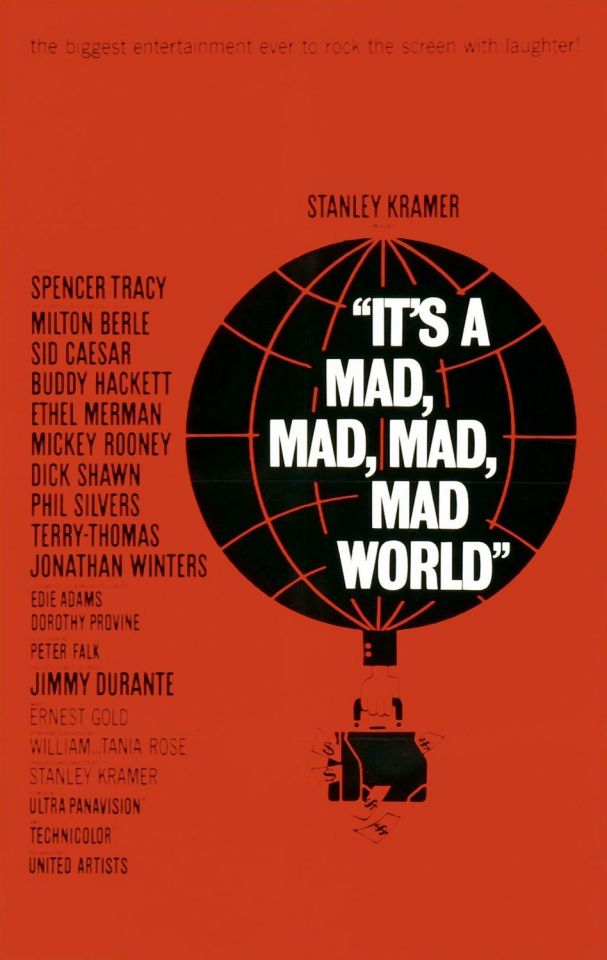
#it's a mad mad mad mad world#spencer tracy#milton berle#sid caesar#buddy hackett#ethel merman#mickey rooney#dick shawn#phil silvers#terry-thomas#jonathan winters#edie adams#dorothy provine#jimmy durante#peter falk#eddie rochester anderson#stanley kramer#1963
13 notes
·
View notes
Text
Some Pitiful Melodies
Sigmund Gottfried Spaeth (1885–1965) sought to popularize classical music and improve the musical tastes of the masses by meeting the public wherever he could find them, from vaudeville halls to national radio broadcasts. September 1, 1934 cover by William Steig. Born in a line of three generations of Lutheran clergymen, Spaeth chose a different path and became a musicologist who sought to…

View On WordPress
#Alan Dunn#Barbara Shermund#Chicago World&039;s Fair 1933#E.B. White#Emmanuel Berl#George Price#Henry Anton Steig#Howard Brubaker#James Thurber#Janet Flanner#Otto Soglow#Peter Arno#Rea Irvin#Richard Decker#Ripley Odditorium#Robert Ripley#Sigmund Spaeth#William Steig
2 notes
·
View notes
Photo


Buddy Lester is not always the strongest, but at least he isn’t Milton Berle or Henny Youngman.
2 notes
·
View notes
Text
Francesco: A História de São Francisco de Assis - Filme Completo Dublado
Francesco: A História de São Francisco de Assis – Filme Completo Dublado GRÁTIS – Biografia. NetMovies – 23 de out.2023 Nome do Filme: Francesco – A História de São Francisco de Assis Título Original: Francesco Gênero: Biografia, Drama Sinopse: Um dos mais belos filmes sobre a vida de São Francisco de Assis. Mais que uma história de vida, Francesco narra, com muita emoção, a jornada de um…

View On WordPress
#Drama Sinopse: Um dos mais belos filmes sobre a vida de São Francisco de Assis#estrela de Harry Potter! Estrelando: Andréa Ferréol#Fabio Bussott#Francesco: A História de São Francisco de Assis - Filme Completo Dublado GRÁTIS - Biografia. NetMovies#Hanns Zischler#Helena Bonham Carter#Mario Adorf#Mickey Rourke#Nikolaus Dutsch#Nome do Filme: Francesco - A História de São Francisco de Assis Título Original: Francesco Gênero: Biografia#Paolo Bonacelli#Peter Berling Direção: Liliana Cavani#renuncia aos valores materiais para viver o cristianismo em sua essência#uma história de vida
0 notes
Text
So we need to find Peter Lorre playing baseball
Because during the filming of "You'll Find Out" (1940), this happened:
The annual charity [baseball] game benefiting Mt. Sinai Hospital and free medical clinic matched the Comedians (including Jack Benny, Fred Allen, Andy Devine, Buster Keaton, the Ritz Brothers, Edgar Kennedy, and Leo Carrillo) against the Leading Men (including Gary Cooper, Tyrone Power, Errol Flynn, Fred Astaire, Randolph Scott, John Wayne, Roy Rogers, Peter Lorre, and others) before a capacity crowd of 37,700 at Wrigley Field on August 8. Paulette Goddard captained the comics and Marlene Dietrich the principals. Milton Berle announced and Kay Kyser, James Gleason, Chico Marx, and Thurston Hall umpired. Lorre apparently lost himself in the 'charity fracas,' which advertised the Jack Benny–Fred Allen rivalry - Allen: “Did you warm up?” Benny: “Yes.” Allen: “I thought I smelled ham burning" - turned 'first-class riot', which was broken up by the Keystone Cops." - The Lost One: A Life of Peter Lorre
Maybe Lorre "lost himself" by managing not to be captured by photograph or film, or managed to stay off the field entirely!
But I am intrigued regardless. He'd look so damn cute in a baseball uniform.
I'm hoping he's at least in the background of pictures from the event - and that those pictures are online.
In the meantime, we do have another person to enjoy:

Boris Karloff's appearance as the Frankenstein Monster was a complete surprise for the crowd; he hadn't been listed on the program!
Buster Keaton was the catcher. As Boris thudded toward home:
"Keaton pretended to faint, keeling over backward, falling to the ground, and allowing Karloff to score the run in dramatic fashion."

Source of above two pictures and great writeup
So: Look for August 8, 1940 pictures, Mt. Sinai Hospital, Wrigley Field, charity baseball game, Leading Men vs Comedians. (It's easier to find pictures from surrounding years, drat.)
Lorre should have been signed up for BOTH teams, to match his talents! That would have been hilarious.
Otherwise, well, we've got him at least holding a baseball bat in this iconic Peter Lorre-Sydney Greenstreet picture. My idle fantasy now is that he absconded with that bat from the charity game and brought it along to the photoshoot. :D

14 notes
·
View notes
Text
The First Self-Proclaimed Drag Queen Was a Formerly Enslaved Man
In the late 19th century, William Dorsey Swann’s private balls attracted unwelcome attention from authorities and the press

In the late 1880s, a formerly enslaved man named William Dorsey Swann started hosting private balls known as drags, a name possibly derived from “grand rag,” an antiquated term for masquerade balls. Held in secret in Washington, D.C., these parties soon caught authorities’ attention.
As the Washington Criticreported in January 1887, police officers who raided one such gathering were surprised to encounter six Black men “dressed in elegant female attire,” including “corsets, bustles, long hose and slippers.” The following April, the Evening Starreported on a raid that targeted men in “female attire of many colors,” as well as “gaudy costumes of silk and satin.” On both occasions, authorities arrested the party guests and charged them with “being suspicious characters.”
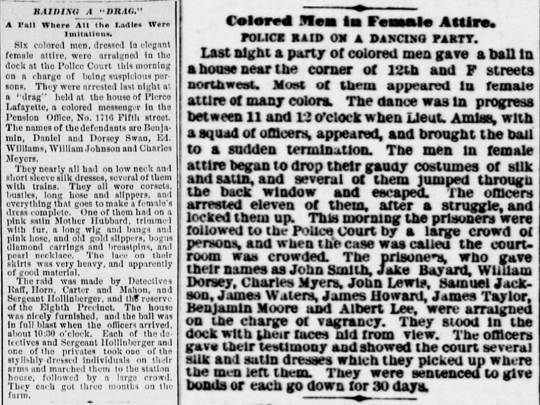
Joseph’s chance find marked the beginning of a yearslong quest to uncover Swann’s story—and, with it, the history of drag in the United States. He chronicles the results of this research in an upcoming book titled House of Swann: Where Slaves Became Queens—and Changed the World. Drawing on extensive archival research, Joseph presents a compelling portrait of the nation’s first self-proclaimed drag queen. The historian proudly positions Swann as the “first queer American hero.”
The identification of Swann as the first reported drag queen in the U.S. is a “major event,” says Jen Manion, a historian at Amherst College. “LGTBQ history is hampered by the lack of diaries and personal letters and family papers, because you just don’t put [those feelings] in writing.” For much of recorded history, Manion adds, being gay or bisexual was considered “a sin; it’s illegal.”
Joseph says his research resurfaces the “experiences of queer people, … historical experiences, not fictionalized experiences, documenting them rather than speculating.” These findings, in turn, helped him pinpoint the birth of “the drag queen.”
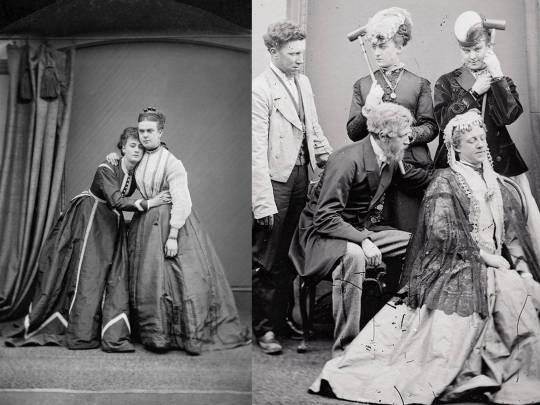
The concept of drag “existed for some period of time unknown,” says Joseph. But the term only came into use in 19th-century Great Britain, where Joseph says it referred to “a gathering of people, particularly men, who were dressing as women.” In 1871, two members of the British aristocracy were put on trial after they were caught dressing as women in public. Authorities charged Ernest “Stella” Boulton and Frederick “Fanny” Park with “conspiring and inciting persons to commit an unnatural offense.” A jury found the defendants not guilty but handed down a minor indictment to the men for wearing women’s clothing.
Cross-dressing, which is often a component of drag, has a lengthy history on both the stage and the screen, from Elizabethan-era performances in which men played women to Japanese Kabuki theater. In the early 20th century, performers like Julian Eltinge became stars by impersonating women during the vaudeville craze. In the 1950s, Milton Berle dressed as a woman on his variety TV show, as did comedian Flip Wilson in the early 1970s. In the early 1980s, the sitcom “Bosom Buddies” starred Tom Hanks and Peter Scolari as two young men who disguise themselves as women so they can live in an inexpensive, women-only apartment building.

Historian Kathleen Casey, author of The Prettiest Girl on Stage Is a Man: Race and Gender Benders in American Vaudeville, takes a much wider view of drag. While she includes all manner of cross-dressing performances in her definition, she doesn’t think there will ever be “a stable meaning of the term ‘drag.’” Casey adds, “Drag is about race, class and sexuality as much as it is about gender. If we focus exclusively on only one of these intersections, we fail to see how drag performances are layered across time and space and can have multiple meanings for different audiences.” Drag, she says, is really about a performer’s own perspective of their work, as well as audiences’ understanding of this work.
Many of the “contemporary categories and terms that we use in modern life to describe LGBTQ people or sexual and gender minorities” date to the late 19th century, says Manion. “Lesbian,” for instance, was first used in a medical journal in 1883. The historian adds, “We debate amongst ourselves as scholars when it seems appropriate to use contemporary terms to describe things [in] the past, but in this case, these were terms used by … the people at the time as well.”

Swann was born into slavery in Washington County, Maryland, around 1858. According to a 2021 entry by Joseph in the African American National Biography, Swann was the fifth of 13 children born to enslaved housekeeper Mary Jane Younker and enslaved wheat farmer and musician Andrew Jackson “Jack” Swann. (His biological father may have been a white man, but Joseph hasn’t found definitive evidence confirming this theory.) After the Civil War ended in 1865, Swann’s parents bought a plot of land and started a farm. Encouraged to work as soon as he was old enough, the young Swann found employment as a hotel waiter. In 1880, he relocated to Washington, where he worked as a janitor and sent money back home to his family.
Like Washington more broadly, the capital’s underground queer networks were divided into white and Black communities that rarely intersected. As a 2019 report prepared for the city’s Historic Preservation Office notes, “It was a hushed fact that Lafayette Square in D.C., which is adjacent to the White House, was a known cruising spot for gay men, both Black and white,” but the majority of these individuals were only interested in liaisons with partners of the same race. An exception to this trend was Washington’s drag scene, which often attracted mixed-race audiences.
Forging a place for himself in the city’s queer Black community, Swann held parties that Joseph deems the first documented “drag balls” in American history. Held in secret, they provided a safe space for gender expression but were risky to attend. “A large but undetermined number managed to flee during the police raids, but the names of those arrested and jailed were printed in the papers, where the men became targets of public scorn,” wrote Joseph for the Nation in 2020. “In post-Civil War America, there was very little patience for men who subverted gender norms.” Sentences for those charged with attending drag balls ranged from around three to ten months.

Around this same time, Swann became enthralled by the “queens of freedom” crowned at Washington’s Emancipation Day parades—annual celebrations first held in April 1866. Historically, each neighborhood was represented by a woman who “personified freedom for Black people,” according to Joseph. Inspired by these queens, Swann started crowning the winners of his dance competitions the “queen of the ball,” says Joseph.
Swann also adopted the title for himself. As the Washington Critic noted on April 13, 1888, “William Dorsey, who, by the way, was the ‘queen,’” was one of 13 people arrested during a raid on a “drag party” the previous night.
“There’s this concept of drag, which is separate, and there’s the concept of queens of freedom, and in D.C. in this particular time, post-slavery, post-Reconstruction, these two concepts collide,” says Joseph. “To identify as a drag queen, which is what William Dorsey Swann did, is combining these two strains, these two cultural traditions.”
The 1880s saw a “wave of laws passed in cities all across the country explicitly banning cross-dressing,” says Manion, who adds that the rules were “applied very selectively” and were riddled with inconsistencies and contradictions. The arrests of Swann and his friends were “even more sensationalized in the press and probably drew the attention of authorities because most of the participants were Black,” Manion explains. “And this is in Jim Crow America. For queer … Black Americans to just see so much joy and freedom in their gender expression at this time was definitely seen as a threat.”

The court sentenced Swann to 300 days in prison. After serving three months of his sentence, Swann, who had pled not guilty, filed a petition for a pardon from President Grover Cleveland, says Netisha Currie, an archives specialist at the National Archives, which houses a copy of the petition. In a show of support, 30 of Swann’s friends signed the document. But U.S. Attorney A.A. Birney argued vehemently against the pardon, stating,“The prisoner was in fact convicted of the most horrible and disgusting offenses known to the law; an offense so disgusting that it is unnamed. … His evil example in the community must have been most corrupting.”
Ultimately, Cleveland denied the petition. Still, wrote Joseph for the Nation, Swann’s unsuccessful attempt to clear his name represents the earliest documented example of an American activist taking “specific legal and political steps to defend the queer community’s right to gather without the threat of criminalization, suppression or police violence.”
As Manion says, “What’s unique about [Joseph’s] work is that it captures a collective community. When we have been able to identify queer and trans figures in this era and earlier, we find them in isolation. And we can seldom connect the dots to say, ‘Oh, these two couples were friends. They always hung out.’ … We have very little evidence of collective socializing.”
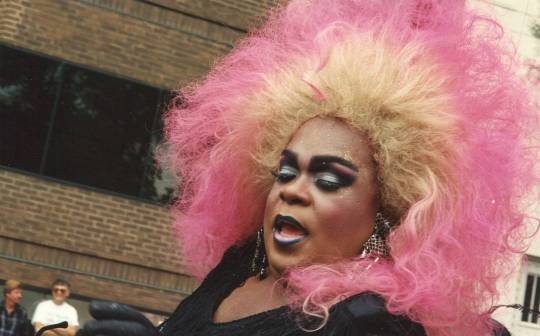
No known pictures of Swann survive. But his contributions to queer activism in Washington will soon be recognized with the redesignation of a stretch of Swann Street Northwest in his honor. The street was originally named for Thomas Swann, a former Maryland governor and Baltimore mayor who bore no relation to the drag queen.
“We have seen so much anti-trans and anti-drag legislation and rhetoric around the country in a very problematic way,” says Brooke Pinto, a D.C. Council member who introduced the bill. “In Washington, D.C., where we are proud to have so many trans residents, we [need to] speak up and recognize, sometimes through symbolism, sometimes through legislation, how important these issues are.”
The bill also calls for a historic plaque to be posted in Dupont Circle, a Washington neighborhood with a rich LGBTQ history. The plaque will sit at the corner of New Hampshire Avenue, Swann Street Northwest and 17th Street Northwest.
“One of the things that’s so exciting about this case is that it is an African American man who was formerly enslaved,” says Manion. Such individuals “just don’t get … recognition in our histories of LGBTQ people, in part because we usually can’t find them in the archives. But … Swann was hiding in plain sight.”
#swann#Drag Balls#Origins of Drag Balls#DC#LGBTQ+#The First Self-Proclaimed Drag Queen Was a Formerly Enslaved Man#William Dorsey Swann#Drag Queens#origins of drag ball culture in DC
14 notes
·
View notes
Text


1 note
·
View note
Text
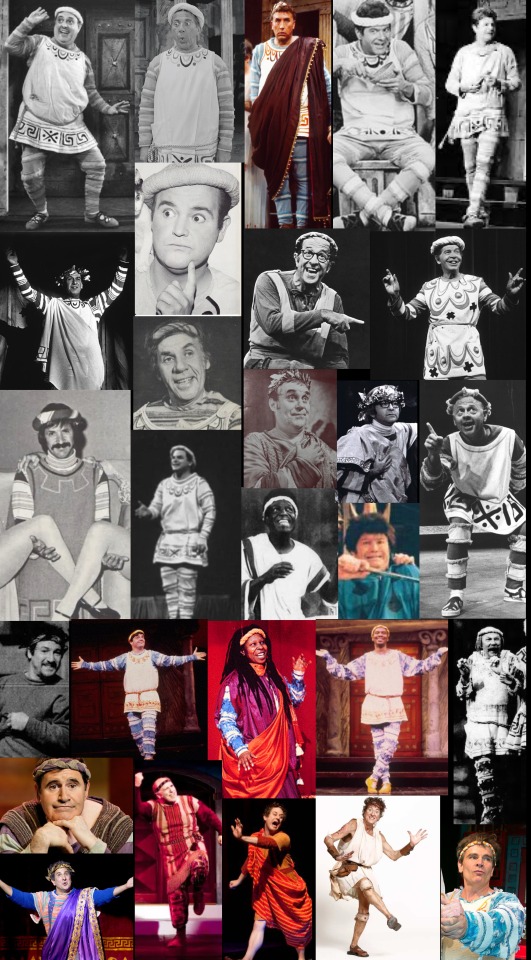
A selection of Pseudolus Zero Mostel (1962), Jerry Lester (1962), Frankie Howerd (1963), Dick Shawn (1964), Sterling Holloway (1965), Jose Ferrer (1965), Dom DeLuis (1965), Phil Silvers (1972), Milton Berle (1975), Sonny Bono (1976), Ray Rayner (1978), Christopher Hewett (1978), Arte Johnson (1976), Mickey Rooney (1987), Jason Alexander (Jerome Robbins' Broadway, 1989), Nipsey Russell (1990), Mickey Dolenz (199?), Eddie Mekka (1995), Nathan Lane (1996), Whoopi Goldberg (1997), David Alan Grier (1997), Rip Taylor (1998), Richard Kind (2008), Lee Wilkof (2010), Christopher Fitzgerald (2010), Geoffrey Rush (2012), Peter Scolari (2013), Frank Ferrante (2017).
2 notes
·
View notes
Text
Which Muppet Show guest stars are dead?
Juliet Prowse died in 1996 at the age of 59.
Connor Stevens is currently still alive at the time of this post at the age of 86
Joel Grey is currently still alive at the time of this post at the age of 92.
Ruth Buzzi is currently still alive at the time of this post at the age of 88.
Rita Moreno is currently still alive at the time of this post at the age of 93.
Jim Nabors died in 2017 at the age of 87.
Florence Henderson died in 2016 at the age of 82
Paul Williams is currently still alive at the time of this post at the age of 84.
Charles Aznavour died in 2018 at the age of 94.
Harvey Korman died in 2008 at the age of 81.
Lena Horne died in 2010 at the age of 92.
Peter Ustinov died in 2004 at the age of 82.
Bruce Forsyth died in 2017 at the age of 89.
Sandy Duncan is currently still alive at the time of this post at the age of 79.
Candice Bergen is currently still alive at the time of this post at the age of 78.
Avery Schreiber died in 2002 at the age of 66.
Ben Vereen is currently still alive at the time of this post at the age of 78.
Phyllis Diller died in 2012 at the age of 95.
Vincent Price died in 1993 at the age of 82.
Valerie Harper died in 2019 at the age of 80
Twiggy is currently still alive at the time of this post at the age of 75.
Ethel Merman died in 1984 at the age of 76.
Kaye Ballard died in 2019 at the age of 93.
Mummenschanz is currently still active but founding member Andres Bossard died in 1992 at the age of 47.
Don Knotts died in 2006 at the age of 81.
Zero Mostel died in 1977 at the age of 62
Milton Berle died in 2002 at the age of 93.
Rich Little is currently still alive at the time of this post at the age of 86.
Judy Collins is currently still alive at the time of this post at the age of 85.
Nancy Walker died in 1992 at the age of 69.
Edgar Bergen died in 1978 at the age of 75.
Steve Martin is currently still alive at the time of this post at the age of 79.
Madeline Kahn died in 1999 at the age of 57.
George Burns died in 1996 at the age of 100.
Dom DeLuise died in 2009 at the age of 75.
Bernadette Peters is currently still alive at the time of this post at the age of 77
Rudolf Nureyev died in 1993 at the age of 54.
Elton John is currently still alive at the time of this post at the age of 77.
Lou Rawls died in 2006 at the age of 72.
Cleo Laine is currently still alive at the time of this post at the age of 97.
Julie Andrews is currently still alive at the time of this post at the age of 89.
Jaye P. Morgan is currently still alive at the time of this post at the age of 93.
Peter Sellers died in 1980 at the age of 54.
Petula Clark is currently still alive at the time of this post at the age of 92.
Bob Hope died in 2003 at the age of 100.
Teresa Brewer died in 2007 at the age of 76.
John Cleese is currently still alive at the time of this post at the age of 85.
Cloris Leachman died in 2021 at the age of 94.
Rita Coolidge is currently still alive at the time of this post at the age of 79 but Kris Kristofferson died in 2024 at the age of 88.
Leo Sayer is currently still alive at the time of this post at the age of 76.
Roy Clark died in 2018 at the age of 85.
Gilda Radner died in 1989 at the age of 42.
Pearl Bailey died in 1990 at the age of 72.
Jean Stapleton died in 2013 at the age of 90.
Alice Cooper is currently still alive at the time of this post at the age of 77
Loretta Lynn died in 2022 at the age of 90.
Liberace died in 1987 at the age of 67.
Marisa Berenson is currently still alive at the time of this post at the age of 78.
Raquel Welch died in 2023 at the age of 82.
James Coco died in 1987 at the age of 56.
Helen Reddy died in 2020 at the age of 78.
Harry Belafonte died in 2023 at the age of 96.
Lesley Ann Warren is currently still alive at the time of this post at the age of 78.
Danny Kaye died in 1987 at the age of 76.
Spike Milligan died in 2002 at the age of 83.
Leslie Uggams is currently still alive at the time of this post at the age of 81.
Elke Sommer is currently still alive at the time of this post at the age of 84.
Sylvester Stallone is currently still alive at the time of this post at the age of 78.
Roger Miller died in 1992 at the age of 56.
Roy Rogers died in 1998 at the age of 86 and Dale Evans died in 2001 at the age of 88
Lynn Redgrave died in 2010 at the age of 67.
Cheryl Ladd is currently still alive at the time of this post at the age of 73.
John Denver died in 1997 at the age of 53.
Crystal Gayle is currently still alive at the time of this post at the age of
Robert Shields is currently still alive at the time of this post at the age of 73 but Lorene Yarnell died in 2010 at the age of 66.
Dyan Cannon is currently still alive at the time of this post at the age of 88.
Victor Borge died in 2000 at the age of 91.
Linda Lavin died in 2024 at the age of 87.
Dudley Moore died in 2092 at the age of 66.
Arlo Guthrie is currently still alive at the time of this post at the age of 77.
Beverly Sills died in 2007 at the age of 78.
Kenny Rogers died in 2020 at the age of 81.
Lola Falana is currently still alive at the time of this post at the age of 82.
Phyllis George died in 2020 at the age of 70.
Dizzy Gillespie died in 1993 at the age of 75
Liza Minnelli is currently still alive at the time of this post at the age of 79.
Anne Murray is currently still alive at the time of this post at the age of 79
Jonathan Winters died in 2013 at the age of 87
Mark Hamill is currently still alive at the time of this post at the age of 73.
Christopher Reeve died in 2004 at the age of 52.
Lynda Carter is currently still alive at the time of this post at the age of 73.
Alan Arkin died in 2023 at the age of 89.
Doug Henning died in 2000 at the age of 52.
Andy Williams died in 2012 at the age of 84.
Carol Channing died in 2919 at the age of 97.
Diana Ross is currently still alive at the time of this post at the age of 80.
Gene Kelly died in 1996 at the age of 83.
Loretta Swift is currently still alive at the time of this post at the age of 87.
Joan Baez is currently still alive at the time of this post at the age of 84.
Shirley Bassey is currently still alive at the time of this post at the age of 88.
James Coburn died in 2002 at the age of 74.
Brooke Shields is currently still alive at the time of this post at the age of 59.
Glenda Jackson died in 2023 at the age of 87.
Senor Wences died in 1999 at the age of 103.
Debbie Harry is currently still alive at the time of this post at the age of 79.
Jean-Pierre Rampal died in 2000 at the age of 78.
Paul Simon is currently still alive at the time of this post at the age of 83.
Melissa Manchester is currently still alive at the time of this post at the age of 74.
Tony Randall died in 2004 at the age of 84.
Mac Davis died in 2020 at the age of 78.
Carol Burnett is currently still alive at the time of this post at the age of 91.
Gladys Knight is currently still alive at the time of this post at the age of 80.
Hal Linden is currently still alive at the time of this post at the age of 93.
Marty Feldman died in 1982 at the age of 48.
Chris Langham is unfortunately currently still alive at the time of this post at the age of 75.
Wally Boag died in 2011 at the age of 90.
Johnny Cash died in 2003 at the age of 71.
Buddy Rich died in 1987 at the age of 69.
Linda Ronstadt is currently still alive at the time of this post at the age of 78.
Roger Moore died in 2017 at the age of 89.
1 note
·
View note
Text
You’re in your senior year in school. Many things are coming to an end pretty soon. So to help you end it with a bang and make it a truly great year I’d like to share the top 35 senior quotes. Uplifting and motivating wisdom to help you finish strong and to feel less stressed about the new beginning that’s coming soon. But also funny sayings to help you have a good time right now and give you some inspiration for what to write in the yearbook. Inspiring and Iconic Senior Quotes “The best way to predict the future is to create it.” – Peter Drucker “If you can imagine it, you can achieve it; if you can dream it, you can become it.” – William Arthur Ward “Don’t feel stupid if you don’t like what everyone else pretends to love.” – Emma Watson “Life is what happens to you while you’re busy making other plans.” – John Lennon “Your time is limited, so don’t waste it living someone else’s life.” – Steve Jobs “One of the lessons that I grew up with was to always stay true to yourself and never let what somebody else says distract you from your goals.” – Michelle Obama “Sometimes you will never know the value of a moment until it becomes a memory.” – Dr. Seuss “In your life, you’ll do things greater than dating the boy on the football team. I didn’t know it at fifteen.” – Taylor Swift “Don’t compare yourself with anyone else in the world. If you do so you are insulting yourself.” – Bill Gates “I can’t think of any better representation of beauty than someone who is unafraid to be herself.” – Emma Stone “The unfortunate, yet truly exciting thing about your life, is that there is no core curriculum. The entire place is an elective.” – Jon Stewart Funny Senior Quotes for the Yearbook “Follow your heart, but take your brain with you.” – Alfred Adler “Goodbye everyone. I’ll remember you all in therapy.” – Plankton ( from SpongeBob) “When I die, I want the people I did group projects with to lower me into the ground so they can let me down one last time.” – Unknown “I am free of all prejudice. I hate everyone equally.” – W.C. Fields “I want to thank Google, Wikipedia, and whoever invented copy and paste. Thank you.” – Stephanie Flores “If you like water, you already like 72% of me.” – Alexandra Vu “If opportunity doesn’t knock, build a door.” – Milton Berle “Experience is the name everyone gives to their mistakes.” – Oscar Wilde Baddie Senior Quotes “I want to thank me for believing in me” – Snoop Dogg “Flaws? Honey, it’s called character.” – Unknown “I don’t care what you think about me. I don’t think about you at all.” – Coco Chanel “Don’t wait for the perfect moment. Take the moment and make it perfect.” – Zoey Sayward “I am ready to face any challenges that might be foolish enough to face me.” – Dwight Schrute (from The Office) “I say if I’m beautiful. I say if I’m strong. You will not determine my story – I will.” – Amy Schumer “I’m not looking for a knight, I’m looking for a sword.” – Rihanna Short, Wise and Uplifting Senior Quotes “Life’s too short to take too serious.” – Mary Engelbreit “Oh, the places you’ll go.” – Dr. Seuss “There are no regrets in life. Just lessons.” – Jennifer Aniston “Dream as if you’ll live forever. Live as if you’ll die today.” – James Dean “Long story short, I survived.” – Taylor Swift “Life can only be understood backwards; but it must be lived forwards.” – Søren Kierkegaard “It is difficult to steer a parked car, so get moving.” – Henrietta Mears “You can only become truly accomplished at something you love.” – Maya Angelou “If it scares you, it might be a good thing to try.” – Seth Godin Want more motivation for this semester? Check out these motivational back to school quotes and also this one filled with uplifting fall quotes for a less stressful season.
0 notes
Text
Events 6.5 (before 1960)
1086 – Tutush, brother of Seljuk sultan Malik Shah, defeats Suleiman ibn Qutalmish, the Turkish ruler of Anatolia in the battle of Ain Salm. 1257 – Kraków, in Poland, receives city rights. 1284 – Battle of the Gulf of Naples: Roger of Lauria, admiral to King Peter III of Aragon, destroys the Neapolitan fleet and captures Charles of Salerno. 1288 – The Battle of Worringen ends the War of the Limburg Succession, with John I, Duke of Brabant, being one of the more important victors. 1610 – The masque Tethys' Festival is performed at Whitehall Palace to celebrate the investiture of Henry Frederick, Prince of Wales. 1644 – The Qing dynasty's Manchu forces led by the Shunzhi Emperor take Beijing during the collapse of the Ming dynasty. 1794 – Haitian Revolution: Battle of Port-Républicain: British troops capture the capital of Saint-Domingue. 1798 – Battle of New Ross: The attempt to spread the United Irish Rebellion into Munster is defeated. 1817 – The first Great Lakes steamer, the Frontenac, is launched. 1829 – HMS Pickle captures the armed slave ship Voladora off the coast of Cuba. 1832 – The June Rebellion breaks out in Paris in an attempt to overthrow the monarchy of Louis Philippe. 1837 – Houston is incorporated by the Republic of Texas. 1849 – Denmark becomes a constitutional monarchy by the signing of a new constitution. 1851 – Harriet Beecher Stowe's anti-slavery serial, Uncle Tom's Cabin, or Life Among the Lowly, starts a ten-month run in the National Era abolitionist newspaper. 1862 – As the Treaty of Saigon is signed, ceding parts of southern Vietnam to France, the guerrilla leader Trương Định decides to defy Emperor Tự Đức of Vietnam and fight on against the Europeans. 1864 – American Civil War: Battle of Piedmont: Union forces under General David Hunter defeat a Confederate army at Piedmont, Virginia, taking nearly 1,000 prisoners. 1873 – Sultan Barghash bin Said of Zanzibar closes the great slave market under the terms of a treaty with Great Britain. 1883 – The first regularly scheduled Orient Express departs Paris. 1888 – The Rio de la Plata earthquake takes place. 1893 – The trial of Lizzie Borden for the murder of her father and step-mother begins in New Bedford, Massachusetts. 1900 – Second Boer War: British soldiers take Pretoria. 1915 – Denmark amends its constitution to allow women's suffrage. 1916 – Louis Brandeis is sworn in as a Justice of the United States Supreme Court; he is the first American Jew to hold such a position. 1916 – World War I: The Arab Revolt against the Ottoman Empire breaks out. 1917 – World War I: Conscription begins in the United States as "Army registration day". 1940 – World War II: After a brief lull in the Battle of France, the Germans renew the offensive against the remaining French divisions south of the River Somme in Operation Fall Rot ("Case Red"). 1941 – World War II: Four thousand Chongqing residents are asphyxiated in a bomb shelter during the Bombing of Chongqing. 1942 – World War II: The United States declares war on Bulgaria, Hungary, and Romania. 1944 – World War II: More than 1,000 British bombers drop 5,000 tons of bombs on German gun batteries on the Normandy coast in preparation for D-Day. 1945 – The Allied Control Council, the military occupation governing body of Germany, formally takes power. 1946 – A fire in the La Salle Hotel in Chicago, Illinois, kills 61 people. 1947 – Cold War: Marshall Plan: In a speech at Harvard University, the United States Secretary of State George Marshall calls for economic aid to war-torn Europe. 1949 – Thailand elects Orapin Chaiyakan, the first female member of Thailand's Parliament. 1956 – Elvis Presley introduces his new single, "Hound Dog", on The Milton Berle Show, scandalizing the audience with his suggestive hip movements. 1959 – The first government of Singapore is sworn in.
0 notes